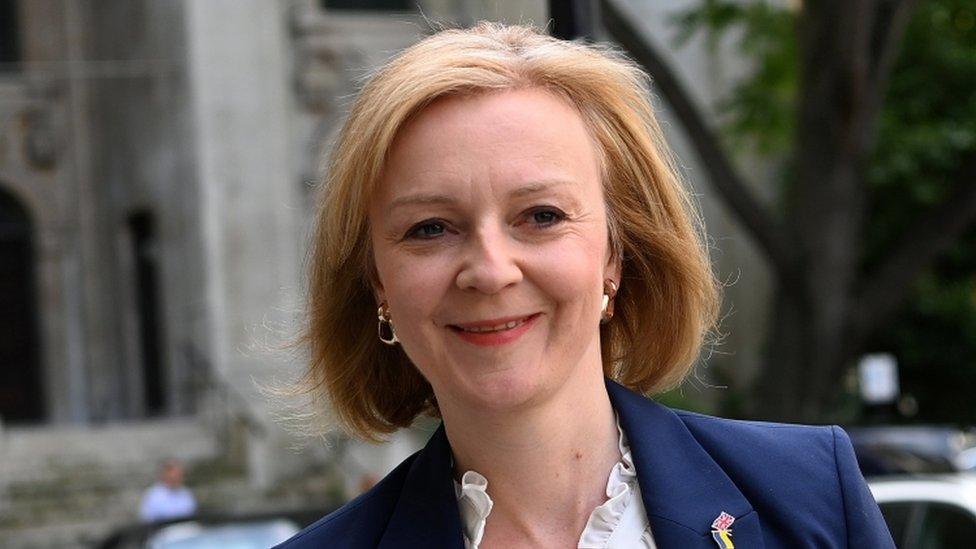Tory leadership: Liz Truss promises new offence of street harassment
- Published

Liz Truss has promised to introduce a national domestic abuse register and a new offence of street harassment if she becomes prime minister.
The Tory leadership contender said politicians must do more to tackle violence against women and girls.
In the past two years the nation had been "shocked" by the number of high profile murders of women, she added.
Labour MP Stella Creasy, who has pushed for misogyny to be made a crime, called it a major U-turn by Ms Truss.
The domestic abuse register being proposed by the foreign secretary would include coercive and controlling behaviour and financial abuse, and would aim to break the cycle of repeat offending.
She said convicted offenders would have to inform the police of their arrangements with new partners and their children, or face harsh penalties.
Ms Truss has also pledged to accelerate the process for handling rape cases, as part of a programme to build on the government's Violence Against Women and Girls Strategy.
She said: "Violence against women and girls doesn't have to be inevitable. Women should be able to walk the streets without fear of harm, and perpetrators must expect to be punished.
"Through increased police training, new offences, faster processes for rape victims and our domestic abuse register we will ensure victims are protected, and crimes are prevented in the first place."
Rishi Sunak, who is also hoping to replace Boris Johnson as prime minister, pledged to make "downblousing" - taking photos down a woman's top without consent - a criminal offence if he succeeds.
He said: "Sexual violence against women and girls should be treated as a national emergency until it has been defeated.
"As a father of two girls, I want them to be able to go for a walk in the evening or to a shop at night without any fear of threat."
Acts such as upskirting (taking photos under a person's clothing without their consent) or voyeurism are currently criminalised in England and Wales, but downblousing is not covered by existing legislation.
'No need' for new law
Calls for a standalone offence of misogyny have intensified since the murders of Sarah Everard and Sabina Nessa, both in London, in 2021. But the government has resisted changing the law.
Boris Johnson told the “óĻó“«Ć½ in October 2021 there was already "abundant statute" to tackle violence against women, and argued by "widening the scope of what you ask the police to do, you will just increase the problem".
Ms Creasy welcomed the proposed new offence put forward by Ms Truss - but pointed out that the foreign secretary had not voted when two separate attempts were made to change the law in Parliament earlier this year.
The Labour MP added that women also faced misogynistic harassment off the streets. She said a coherent approach was needed across the criminal justice system so courts had the power to punish "those whose hatred of women means they seek to cause them harm".
Maya Tutton, co-founder of Our Streets Now, a campaign to make sexual harassment in public a criminal offence, said: "This commitment is a big step in the right direction.
"Any legislation must make all forms of public sexual harassment illegal, be available for all those who need it, and recognise the unwanted and harmful sexualised nature of this behaviour.
"Legislation is just one part of the puzzle, and we hope that both candidates commit to the whole society, prevention-based approach needed to tackle the roots of this problem."